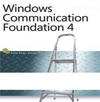Admission
This course is intended for application developers who know how to build and consume Web services in Microsoft .NET Framework 2.0 and how to use the common features of the base class library. The application developers do not have to understand concepts such advanced WS-*, Web Services Enhancements (WSE), service life cycle management, and diagnostics.
Windows Communication Foundation
| Exam # |
Duration |
Language |
Level |
Type |
Classroom |
Code |
Fees |
|
-- |
24 |
English |
Professional |
Course |
Classroom |
Cs384 |
0 LE |
Description :
This course provides students with the knowledge and skills to build and configure a Windows Communication Foundation (WCF) solution
Objectives :
-
Build a simple WCF service and client.
-
Create and configure a service as a managed application and select an appropriate hosting option.
-
Expose a WCF service over different endpoints and add run-time functionality by using behaviors.
-
Improve debugging capabilities by examining messages and service activity.
-
Define service, operation, and data contracts to meet application requirements.
-
Add error handling to a WCF application.
-
Address service quality issues such as performance, availability, concurrency, and instance management.
-
Implement security in a WCF application.
-
Protect data integrity through correct use of transactions.
Topics :
Getting Started with Windows Communication Foundation
-
Designing an Application to Be Part of a Service Oriented Architecture
-
Overview of WCF Architecture
-
Using a Language-Level Interface As a Service Contract
-
Implementing a Simple WCF Service in Visual Studio 2008
-
Consuming a simple WCF service in Visual Studio 2008
Configuring and Hosting WCF Services
-
Programmatically Configuring a Managed Application to Host a WCF Service
-
Programmatically Configuring a Managed Application to Call a WCF Service
-
Defining Client and Service Settings by Using File-Based Configuration
-
Selecting a Hosting Option for a WCF Service
-
Deploying a WCF Service
Endpoints and Behaviors
-
Exposing WCF Services Over Different Endpoints
-
Adding Behaviors to Services and Endpoints
-
Interoperating with Non-WCF Web services
Debugging and Diagnostics
-
Logging Messages
-
Activity Tracing
Designing and Defining Contracts
-
Designing a Coherent and Cohesive WCF Service Interface
-
Defining a Service Contract
-
Defining Operations on a Service
-
Defining a Data Contract
Handling Errors
-
Relating .NET Exceptions to Service-Level Faults
-
Using Faults in a Service
-
Handling Faults and Exceptions on Clients
Improving WCF Service Quality
-
Managing WCF Service Instances
-
Managing Concurrency Issues
-
Improving WCF Service Quality
Implementing WCF Security
-
Overview of Security in WCF
-
Applying Overall Security Requirements to a Binding
-
Specifying Required Client and Service Credentials
-
Working With Security Information
Implementing Transactions
-
Overview of Transactions in a Service-Oriented Application
-
Creating Transactional Service Operations
-
Enabling the Flow of Transactions from Client to Service
Recommended Knowledge :
Before attending this course, students should have intermediate experience of developing applications by using previous versions of Microsoft Visual Studio development system at level 200.
Recommended Course(s) :
Visual Basic 2005 Core
Visual C# 2005 Core
Training Materials :
Microsoft Official Courseware (MOC)
Labs :
This course includes several labs to ensure you will gain the targeted skills and experience.
Credential :
This course is a credit towards MCTS: Microsoft .NET Framework 3.5 - Windows Communication Foundation and MCPD: Enterprise Application Developer 3.5
Category :
Programming
The Instructor:
